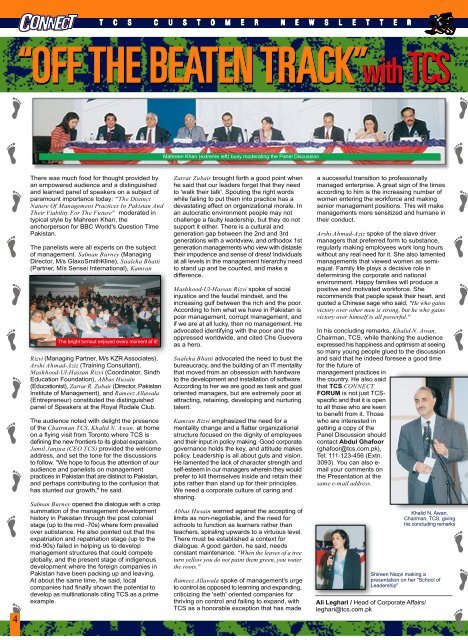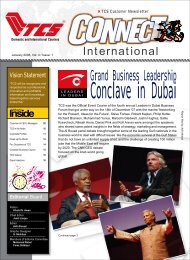Download - TCS Courier
Download - TCS Courier
Download - TCS Courier
Create successful ePaper yourself
Turn your PDF publications into a flip-book with our unique Google optimized e-Paper software.
4<br />
There was much food for thought provided by<br />
an empowered audience and a distinguished<br />
and learned panel of speakers on a subject of<br />
paramount importance today: "The Distinct<br />
Nature Of Management Practices In Pakistan And<br />
Their Viability For The Future" moderated in<br />
typical style by Mahreen Khan, the<br />
anchorperson for BBC World's Question Time<br />
Pakistan.<br />
The panelists were all experts on the subject<br />
of management. Salman Burney (Managing<br />
Director, M/s GlaxoSmithKline), Sualeha Bhatti<br />
(Partner, M/s Sensei International), Kamran<br />
The bright turnout enjoyed every moment of it!<br />
Rizvi (Managing Partner, M/s KZR Associates),<br />
Arshi Ahmad-Aziz (Training Consultant),<br />
Mashhood-Ul-Hassan Rizvi (Coordinator, Sindh<br />
Education Foundation), Abbas Husain<br />
(Educationist), Zarrar R. Zubair (Director, Pakistan<br />
Institute of Management), and Rameez Allawala<br />
(Entrepreneur) constituted the distinguished<br />
panel of Speakers at the Royal Rodale Club.<br />
The audience noted with delight the presence<br />
of the Chairman <strong>TCS</strong>, Khalid N. Awan, at home<br />
on a flying visit from Toronto where <strong>TCS</strong> is<br />
defining the new frontiers to its global expansion.<br />
Jamil Janjua (CEO <strong>TCS</strong>) provided the welcome<br />
address, and set the tone for the discussions<br />
to follow. "We hope to focus the attention of our<br />
audience and panelists on management<br />
practices in Pakistan that are distinct to Pakistan,<br />
and perhaps contributing to the confusion that<br />
has stunted our growth," he said.<br />
Salman Burney opened the dialogue with a crisp<br />
summation of the management development<br />
history in Pakistan through the post colonial<br />
stage (up to the mid -70s) where form prevailed<br />
over substance. He also pointed out that the<br />
expatriation and repatriation stage (up to the<br />
mid-90s) failed in helping us to develop<br />
management structures that could compete<br />
globally, and the present stage of indigenous<br />
development where the foreign companies in<br />
Pakistan have been packing up and leaving.<br />
At about the same time, he said, local<br />
companies had finally shown the potential to<br />
develop as multinationals citing <strong>TCS</strong> as a prime<br />
example.<br />
Mahreen Khan (extreme left) busy moderating the Panel Discussion<br />
Zarrar Zubair brought forth a good point when<br />
he said that our leaders forget that they need<br />
to 'walk their talk'. Spouting the right words<br />
while failing to put them into practice has a<br />
devastating effect on organizational morale. In<br />
an autocratic environment people may not<br />
challenge a faulty leadership, but they do not<br />
support it either. There is a cultural and<br />
generation gap between the 2nd and 3rd<br />
generations with a worldview, and orthodox 1st<br />
generation managements who view with distaste<br />
their impudence and sense of dress! Individuals<br />
at all levels in the management hierarchy need<br />
to stand up and be counted, and make a<br />
difference.<br />
Mashhood-Ul-Hassan Rizvi spoke of social<br />
injustice and the feudal mindset, and the<br />
increasing gulf between the rich and the poor.<br />
According to him what we have in Pakistan is<br />
poor management, corrupt management, and<br />
if we are at all lucky, then no management. He<br />
advocated identifying with the poor and the<br />
oppressed worldwide, and cited Che Guevera<br />
as a hero.<br />
Sualeha Bhatti advocated the need to bust the<br />
bureaucracy, and the building of an IT mentality<br />
that moved from an obsession with hardware<br />
to the development and installation of software.<br />
According to her we are good as task and goal<br />
oriented managers, but are extremely poor at<br />
attracting, retaining, developing and nurturing<br />
talent.<br />
Kamran Rizvi emphasized the need for a<br />
mentality change and a flatter organizational<br />
structure focused on the dignity of employees<br />
and their input in policy making. Good corporate<br />
governance holds the key, and attitude makes<br />
policy. Leadership is all about guts and vision.<br />
He lamented the lack of character strength and<br />
self-esteem in our managers wherein they would<br />
prefer to kill themselves inside and retain their<br />
jobs rather than stand up for their principles.<br />
We need a corporate culture of caring and<br />
sharing.<br />
Abbas Husain warned against the accepting of<br />
limits as non-negotiable, and the need for<br />
schools to function as learners rather than<br />
teachers, spiraling upwards to a virtuous level.<br />
There must be established a context for<br />
dialogue. A good garden, he said, needs<br />
constant maintenance. "When the leaves of a tree<br />
turn yellow you do not paint them green, you water<br />
the roots."<br />
Rameez Allawala spoke of management's urge<br />
to control as opposed to learning and expanding,<br />
criticizing the 'seth' oriented companies for<br />
thriving on control and failing to expand, with<br />
<strong>TCS</strong> as a honorable exception that has made<br />
a successful transition to professionally<br />
managed enterprise. A great sign of the times<br />
according to him is the increasing number of<br />
women entering the workforce and making<br />
senior management positions. This will make<br />
managements more sensitized and humane in<br />
their conduct.<br />
Arshi Ahmad-Aziz spoke of the slave driver<br />
managers that preferred form to substance,<br />
regularly making employees work long hours<br />
without any real need for it. She also lamented<br />
managements that viewed women as semiequal.<br />
Family life plays a decisive role in<br />
determining the corporate and national<br />
environment. Happy families will produce a<br />
positive and motivated workforce. She<br />
recommends that people speak their heart, and<br />
quoted a Chinese sage who said, "He who gains<br />
victory over other men is strong, but he who gains<br />
victory over himself is all powerful."<br />
In his concluding remarks, Khalid N. Awan,<br />
Chairman, <strong>TCS</strong>, while thanking the audience<br />
expressed his happiness and optimism at seeing<br />
so many young people glued to the discussion<br />
and said that he indeed foresee a good time<br />
for the future of<br />
management practices in<br />
the country. He also said<br />
that <strong>TCS</strong> CONNECT<br />
FORUM is not just <strong>TCS</strong>specific<br />
and that it is open<br />
to all those who are keen<br />
to benefit from it. Those<br />
who are interested in<br />
getting a copy of the<br />
Panel Discussion should<br />
contact Abdul Ghafoor<br />
(ghafoor@tcs.com.pk),<br />
Tel: 111-123-456 (Extn.<br />
3093). You can also email<br />
your comments on<br />
the Presentation at the<br />
same e-mail address.<br />
Shireen Naqvi making a<br />
presentation on her "School of<br />
Leadership"<br />
Ali Leghari / Head of Corporate Affairs/<br />
leghari@tcs.com.pk<br />
Khalid N. Awan,<br />
Chairman, <strong>TCS</strong>, giving<br />
his concluding remarks



